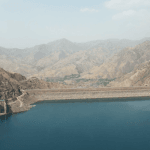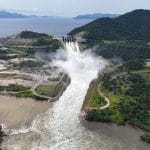Uzbekistan’s Joint Stock Company Uzkimyosanoat announced urea production has begun at the new, $985 million ammonia and urea production complex at Navoiyazot, Uzbekistan’s Energy Ministry said.
Navoiyazot is one of Uzbekistan’s largest chemical plants and produces mineral fertilizers by processing natural gas. Construction of the new, world-class complex began in September 2016 to replace two outdated and energy inefficient facilities – built in the 1960s. The new complex produced its first urea on December 23, 2020, the ministry said on January 5.
“I would like to thank our national and international partners who supported the construction of the new ammonia and urea production complex at JSC Navoiyazot,” Uzkimyosanoat Chairman Jurabek Mirzamakhmudov said. “Commissioning of the new complex was completed within 53 days despite Covid and existing restrictions, testament to the hard work of all involved,” he added.
“This world-class industrial facility is another step towards natural gas monetization via the production of export oriented and high value-added products – and the first urea production is a milestone achievement,” Mirzamakhmudov said.
The new complex has capacity to produce 660,000 tonnes of ammonia and 577,500 tonnes of urea, Uzbekistan’s Energy Ministry said, adding that 330,000 tonnes of ammonia will be used to produce new urea and 330,000 tonnes to produce ammonium nitrate.
When at full production capacity, the complex will expand Uzbekistan’s domestic chemical production by 9.5%, provide annual revenue of 600 billion Soums and export $58 million worth of additional products.
Completion of the plant will meet domestic agriculture demand for urea and provide up to 100-150 kg/ha of additional mineral fertilizers during agrotechnical periods for grain and cotton crops.
Production will also be exported to neighbouring countries in Central Asia as well as Turkey, Ukraine, and Georgia.
Japanese banks and financial institutions provided $577 million of loan finance for the project, a $320 million loan was provided by the Fund for Reconstruction and Development of the Republic of Uzbekistan, with $88.7 million coming from the company’s own funds.
Additional cooperation was provided by a consortium of Japanese companies, Mitsubishi Heavy Industries Ltd and Mitsubishi Corporation. The complex’s main equipment was imported from Japan and Europe. It also uses production technologies from leading international companies such as Denmark’s Haldor Topsoe, Italy’s Sapiem and Germany’s Uhde.







